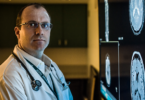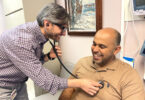Scientists at Sunnybrook Research Institute (SRI) are inventing the future of health care by developing innovative tools and devices that aim to solve some of health care’s most complex challenges.
Osteoporosis is often referred to as the “silent thief”. The disease is caused by low bone mineral density (BMD) and can occur over a number of years without any symptoms. It is often diagnosed when the first fracture occurs and the disease is already fairly advanced and less treatable. At least one in three women and one in five men will break a bone due to osteoporosis in their lifetime.
Artificial intelligence screening tool, Rho, was developed by 16 Bit inc., a Toronto-based medical device company founded by Canadian radiologists Dr. Mark Cicero and Dr. Alexander Bilbily, radiologist and affiliate scientist at Sunnybrook Health Sciences Centre. The company’s mission is to create trusted AI-based medical software to improve the quality and accessibility of health care for all. Rho automatically screens patient x-ray scans for low BMD and alerts physicians of increased risk of osteoporosis which allows patients and physicians to work together to create preventative treatment plans.
We recently sat down with Dr. Bilbily to chat about how Rho is shaping the future of health care.

What inspired you to become an inventor and create Rho?
I enjoy my clinical work, but its impact scales linearly – I can only help one patient at a time. What excites me about software is it can scale exponentially, creating value even while I’m asleep, camping in the backcountry, or chasing after my toddler.
We created Rho because our health-care system urgently needs smarter, more sustainable solutions. With an aging population, rising costs, and limited resources, we have to find ways to improve care while reducing expenses. Rho identifies patients at high risk for osteoporosis using x-rays they’ve already had without extra imaging or added cost. This enables much earlier intervention which prevents devastating fractures for patients and reduces cost to the health-care system. We have successfully built and deployed the first tool of this kind which has already impacted the lives of over 300,000 Canadians.
What skills or traits have helped you the most in your journey as an inventor and entrepreneur?
Curiosity, the ability to learn quickly, and empathy have all been essential. As a physician, transitioning into entrepreneurship meant learning an entirely new language – product development, branding, market strategy and, regulatory affairs. My curiosity pushed me to dive in, and years of medical training helped me to quickly learn and adapt.
Empathy has been a key strength because it has helped me build a strong partnership with my co-founder, recruit a mission-driven team, and deeply understand the needs of our customers and patients.
What advice would you give to someone interested in launching a health-care company to commercialize their discoveries?
Start with something you think the world needs – something you’re willing to spend 10 years of your life building. Healthtech is hard. It comes with all the usual start-up challenges, plus regulatory, clinical validation, and compliance hurdles that increase cost, risk, and time. If your motivation is just financial, it’s hard to weather the storm. But if you’re mission-driven, that purpose will sustain you and attract others who share your vision like key teammates, advisors, and early customers.
How has Sunnybrook and INOVAIT enabled you to make your technology a reality?
INOVAIT, [Canada’s image-guided therapy and AI network led by Sunnybrook], has been essential at every step of Rho’s journey. Through the Pilot Fund in 2022, they helped support our AI model development, early user testing, and Health Canada approval. That funding and visibility gave us a critical boost to land our first customers. More recently, the FOCUS Fund has supported our commercialization efforts which included helping us expand Rho’s capabilities, build evidence through publications, and grow into international markets.
Sunnybrook has also played a pivotal role – from running Rho’s first prospective clinical trial with CAN Health Network, to supporting bold new research in my lab. That includes exploring next-generation AI use cases in medicine – some of which are admittedly a bit out there, but might just shape the future.








